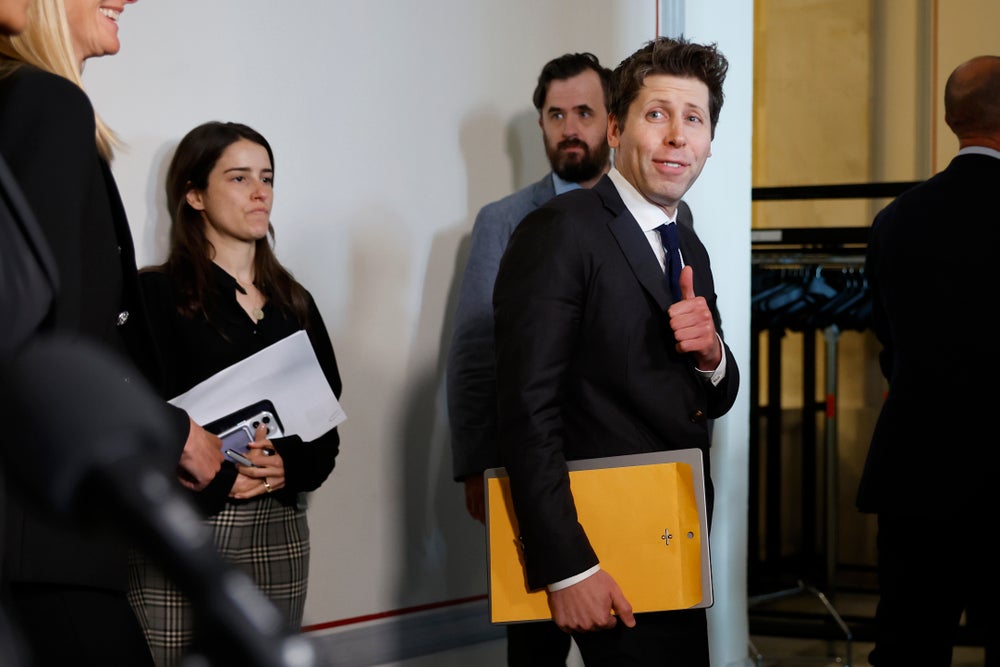The 38-Year-Old Leader of the AI Revolution Can't Believe It Either – Meet Open AI CEO Sam Altman Altman is also involved in several other futuristic technology projects.
By Sam Silverman •
Key Takeaways
- Sam Altman is the 38-year-old CEO of OpenAI.
- He dropped out of Stanford in 2005 to start his first company.
In a few short years, Sam Altman has become one of the most influential names in the artificial intelligence movement.
The 38-year-old is the CEO of OpenAI, the artificial intelligence lab that created and released ChatGPT in November, which is an AI chatbot that produces human-like responses to questions.
The product launch generated 100 million users in its first two months and sparked competition with others releasing similar products like Google's Bard. The launch also brought in $17.9 Billion in AI funding in Silicon Valley, according to Bloomberg.
"I can't imagine that this would have happened to me," Altman told Intelligencer about his new role as leader of the artificial intelligence movement.
Keep scrolling to see more details about Altman's rise to tech entrepreneurship.
 Photo by Chip Somodevilla/Getty Images | OpenAI CEO Sam Altman gives a thumbs-up as he departs the closed-door "AI Insight Forum" outside the Kennedy Caucus Room in the Russell Senate Office Building on Capitol Hill on September 13, 2023 in Washington, DC.
Photo by Chip Somodevilla/Getty Images | OpenAI CEO Sam Altman gives a thumbs-up as he departs the closed-door "AI Insight Forum" outside the Kennedy Caucus Room in the Russell Senate Office Building on Capitol Hill on September 13, 2023 in Washington, DC.
Who Is Sam Altman?
Sam Altman was born in Chicago in 1985.
He learned to program and disassemble computers at age 8, according to the New Yorker. He came out as gay when he was 16, and says it was in part due to the help of "transformative" AOL chatrooms.
Altman attended Stanford in the early aughts but dropped out in 2005 to start Loopt, an app that allowed users to share their location with others, per the Washington Post. He went on to sell the company for $43.4 million to Green Dot in 2012, according to Intelligencer.
He went on to become the president of Y Combinator, which helps raise money for tech startups in 2014. Prior to stepping on as president, Y Combinator helped raise money for Loopt in the app's early days, per Intelligencer.
During his time as president, the company saw 40,000 startup applications each year.
When did Sam Altman start OpenAI?
Altman co-founded OpenAI in 2015 with Elon Musk, Ilya Sutskever, Greg Brockman, John Schulman, and Wojciech Zaremba. The company started as a non-profit with the goal of creating "a computer that can think like a human in every way and use that for the maximal benefit of humanity." Additionally, the tech founders wanted to dominate the AI field before the technology was used for ill will, according to Intelligencer.
Altman became CEO of OpenAI and left Y Combinator in 2019 after Musk walked away from the project in 2018 over fears the company was falling behind Google, per the outlet.
RELATED: Microsoft Invests Billions in OpenAI, Creator of ChatGPT
Under Altman's leadership, the company switched to a for-profit business in 2019, and within a few months, raised $1 billion from Microsoft.
OpenAI sold its ChatGPT software to businesses before releasing it to the public in November 2022, according to Intelligencer.
"The exciting parts are almost too long to list," Altman told Time magazine in June when discussing his product that can do anything from automating mundane tasks to helping with medical diagnoses from a single prompt.
OpenAI has been subjected to criticism
While the launch of ChatGPT proved to be a massive success, with 100 million users in the first two months, it has also been met with great pushback.
Incorporating AI into society has raised questions about intellectual property and one's right to their name and likeness. It is also a major aspect in the current SAG-AFTRA actors strike with actors fearing they will be replaced by AI, according to Variety. Notable celebrities and influencers have also been speaking out about the possible dangers of AI, including Tom Hanks and MrBeast.
"The scary part is just sort of putting this lever into the world will for sure have unpredictable consequences," he added when he spoke to Time.
The tool has been under fire for generating false information about various individuals, in addition to security concerns following a bug that allowed some users to see other users' chat history and payment-related information, according to NPR.
In July, an FTC investigation was launched into the company after allegedly using datasets of copyrighted works to train its models. First reported by the Washington Post, author Michael Chabon filed a class action lawsuit against the company after learning just books were used without his permission to teach ChatGPT.
Altman is now advocating for government regulation.
"I think if this technology goes wrong, it can go quite wrong, and we want to be vocal about that. We want to work with the government to prevent that from happening," Altman said before a Senate subcommittee while discussing regulating artificial intelligence in May, according to a transcript obtained by NPR. "But we try to be very clear-eyed about what the downside case is and the work that we have to do to mitigate that."
What Is Sam Altman's Net Worth?
Sam Altman has been keeping his life private, but TheStreet reported that he has a net worth of $500 million.
Apart from OpenAI, Altman has invested in several other companies in anticipation of the rise of the artificial intelligence industry.
According to Intelligencer, Altman invested $375 million in nuclear fusion company Helicon Energy, which is building the world's first fusion power plant to create unlimited clean electricity. As an early investor, he could control one of the world's cheapest energy sources, per Intelligencer.
He also invested $180 million in Retro Biosciences, which is studying how to add ten years to the human lifespan. According to a company press release, it is researching cellular reprogramming and plasma therapies to one day develop "therapeutics eventually capable of multi-disease prevention."
In addition to OpenAI, Altman founded Worldcoin, an iris biometric cryptocurrency project, in 2019 and raised $115 million for its development. Worldcoin's technology would scan people's irises to link to a crypto wallet and allow Worldcoin to make deposits using one's iris as a key. This technology could potentially help identify humans from nonhumans as artificial intelligence grows in sophistication.
Aside from his investments, he spends his earnings racing cars, including a Lexus LFA which could cost upwards of $375,000, according to the Kelley Blue Book.
He also owns a ranch in Napa with his partner Oliver Mulherin and he purchased a $27 million home in the upscale San Francisco neighborhood Russian Hill.









